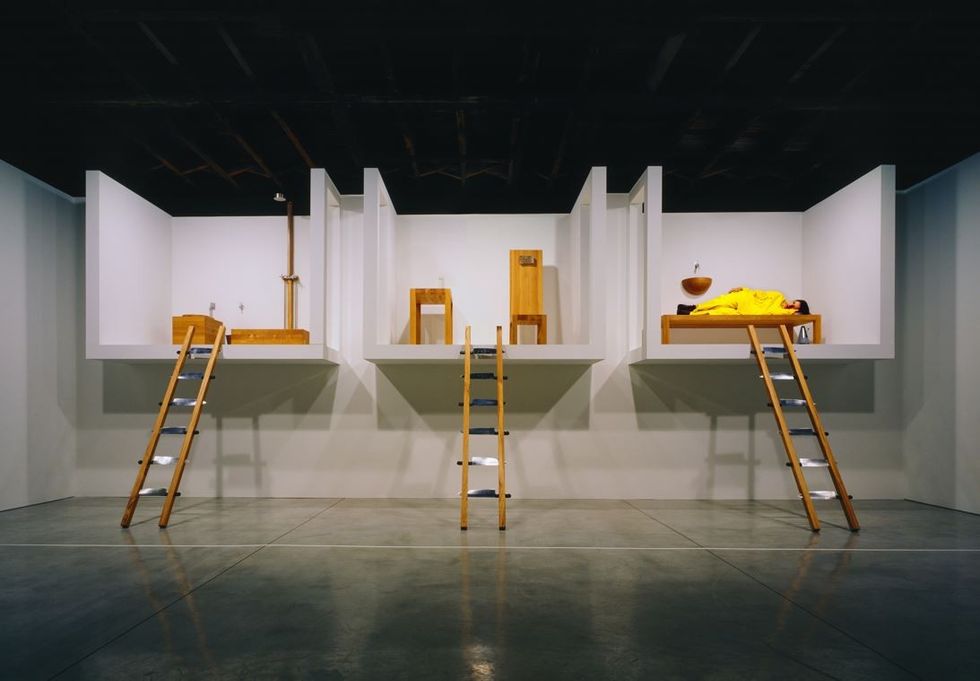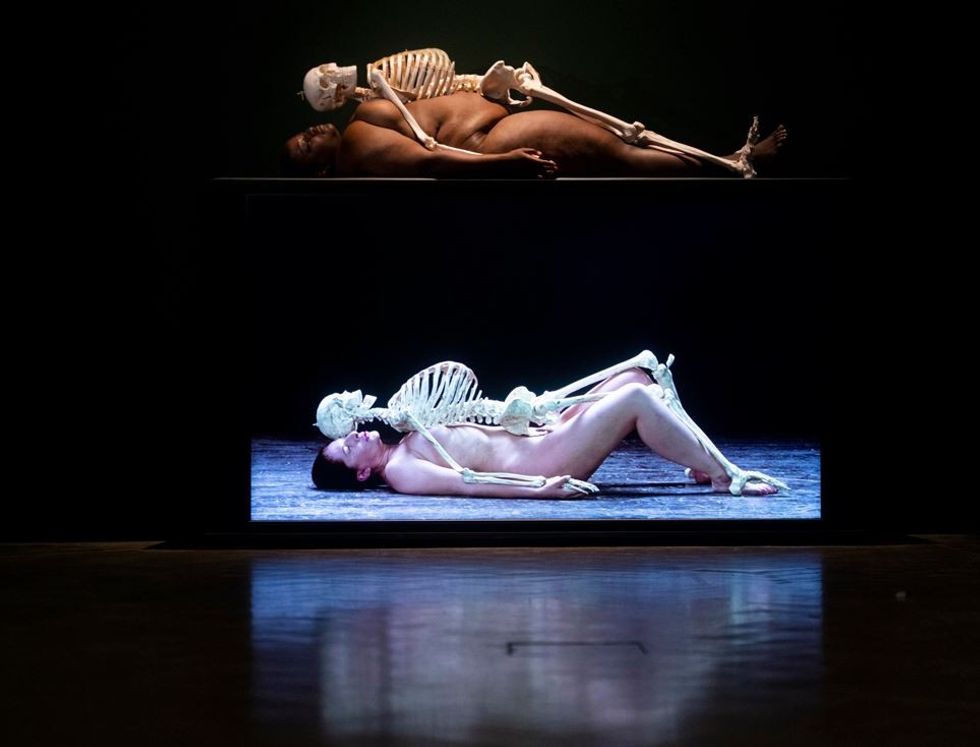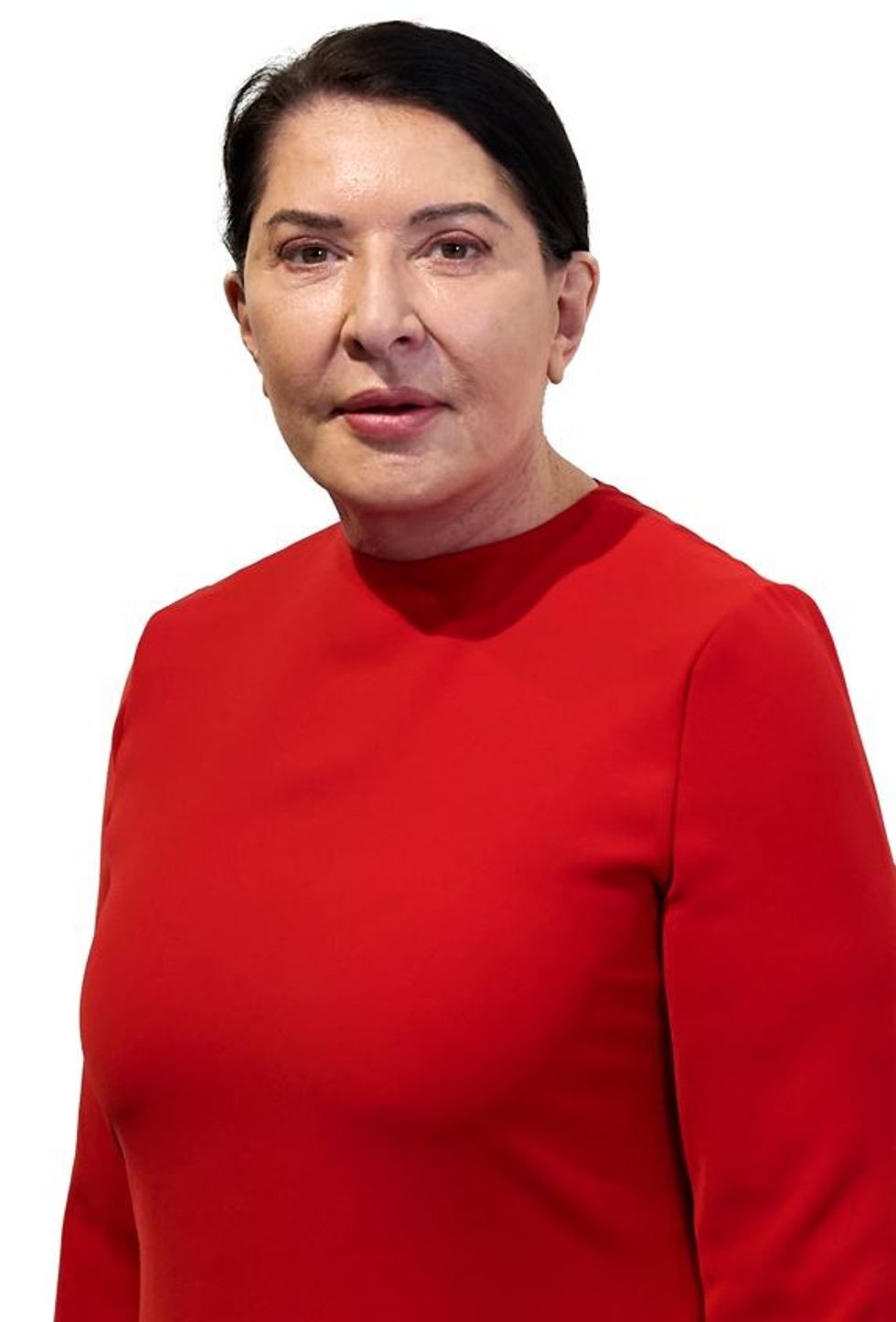ASIAN visitors to the Royal Academy may be baffled, possibly even a little scandalised, by Marina Abramovic’s solo exhibition.
Born in 1946 in then Yugoslavia, she is credited with bringing performance art into the mainstream. In a career lasting 55 years, she has pushed her own body to the extremes of physical and mental endurance. She has “withstood pain, exhaustion and danger in her quest for emotional and spiritual transformation”.
In one work called Imponderabilia, visitors are invited to push their way through the narrow gap between a man and woman standing upright and facing each other in order to get from one room to another. What makes the experience unusual is the man and the woman are completely naked (not being brave, I opted for a side entrance). The work, which explores the idea of “the artist as a door to the museum”, was first performed at the Museum of Modern Art in New York in 1977.
In another work, Nude with Skeleton, performance artists lie beneath skeletons, which rise and fall with their breath. The artwork, first enacted in 2002, was inspired by an exercise practised by Tibetan Buddhist monks, which involves sleeping alongside the dead as a means of conquering a fear of dying.

In The House with the Ocean View, an artist lives in a special construction in open view of the audience. But for 12 days and nights, the artist can only drink water and is not allowed to speak to anyone. First done in New York in 2002 in the wake of the 9/11 terrorist attacks on the Twin Towers, audiences were invited to witness and share in the simple act of living. The house built above the ground has three small compartments, but the artist cannot come down because the ladders have rungs made of razor-sharp knives.
In one room, there is a table laden with knives and chains. On a wall above the table are photographs taken at Studio Morra in Naples in 1974, when Abramovic arranged 72 objects on a table, including lipstick, scissors, feathers, a rose, a bullet and a gun. She stood in the gallery for six hours, beside a written instruction that the objects could be used on her “as desired”. During the performance, visitors graffitied her body with the lipstick, cut her clothes with the scissors, placed the loaded gun in her hand and aimed it at her head.
For Lovers, there is footage from 1998 when she and her late partner, Frank Uwe Laysiepen, known professionally as Ulay, a German artist based in Amsterdam, walked for 90 days across the Great Wall of China from opposite ends, meeting briefly. Then they split up as a couple.
Visitors might think the artist is bonkers, but when she gives a press conference, she is wonderfully eloquent. Everything she said made complete sense.
She revealed she was so ill she nearly died three months ago. She would not do any of the performances herself, but these would be enacted by numerous artists she had trained.

“This exhibition is very, very different and so complex,” she said. “I’m doing installations, I’m doing films, I am doing objects, I am doing interaction, transitory sculptures, I am doing Polaroids, paper rubbings, all of these elements which the normal public doesn’t know.”
She was hoping to do “opera” in the Royal Academy’s main courtyard involving members of the public.
An Asian journalist asked her: “Do you think a musical might be on the cards – Marina Abramovic the musical?”
To this “great, great question”, she responded mischievously: “Is this a direct invitation to Bollywood?”
“Are you Indian?” she asked the journalist. On hearing the reply, she said: “Pakistani? Okay, this is almost close.”
She next invoked Mahatma Gandhi to explain how getting acceptance for performance art had been an uphill struggle: “I really love the sentence of Gandhi. He said a long time (ago) and I was thinking what he said, you can apply so much to every performance artist who started in the 1970s with so much resistance and then continued working on the performance. Gandhi said, ‘First, they ignore me. Second, they laugh at me. The third, they fight me. The fourth, I win.’
” At that, she received a spontaneous round of applause.
She also did not want to be defined either by her sex or nationality. She also said art was never created by happiness.

“I say so openly so many times, I am not feminist,” she declared. “I never want any ‘isms’. I came from ex-Yugoslavia, I came from the really hardcore communist background. My mother was what I’ve been fighting against more than anything else. I create my own idea, do performance work and the body became my medium. Art should not have any gender. Doesn’t matter who is making art – man or woman on transgender or black or race or religious belonging. It doesn’t matter - all this. Only one thing matters – is it good or bad art? I am female, my body is female, but my art doesn’t have gender.”
As for her nationality, “when I left Yugoslavia it was my country. It is now six countries. But when Tito was alive, it was Yugoslavia, I went to live in Holland. I got a Dutch passport which I still have. I live in America, I live in Berlin, I live in Rome, I live everywhere. I always feel that the planet is my studio. I come from the Balkans and you can’t take the Balkans away from me in so many ways. But, at the same time, I don’t feel a Dutch artist. I don’t feel an American artist. My work comes from looking at different cultures and I make my own personal mix.”
She believed in giving “150 per cent” effort, being honest and also in failure. “I tell too many painful, too many emotional things I’m not supposed to tell,” she said. “But I love not to have secrets. When you share pain with others, you’re free. And it’s so important to be free.”
It was also important for her to include failure in her work “because I learned from them. Your success should be measured by your amount of failures.”
She spoke of a specific work: “Why is this called The House with the Ocean View when you know very well there’s no ocean in front of you. But the idea of ocean was ocean of the minds of the visitors coming and looking at the piece. And this performance actually changed the state of my consciousness.”

She has done performances in which members of the public have taken turns to sit silently in front of her. And her performances were not for an hour or two. “It’s something very different if you do hours and hours, you can’t pretend, you can’t act, you’re vulnerable, you show your true self. You make a connection with the public in very strong way.”
Asked about why she had subjected herself to pain, she responded: “That was at the beginning of my career. You want to see the limits of the physical body. But when you have reached the limits and you understand what pain means, I didn’t need to do that any more. I always move on. I don’t want to repeat myself; I need to surprise myself. Emotional pain is more difficult.”
Marina Abramovic is at the Royal Academy until January 1, 2024






 Naeli and the secret song
Naeli and the secret song








 Jamie Lloyd’s Evita with Rachel Zegler set for Broadway after London triumphInstagram/
Jamie Lloyd’s Evita with Rachel Zegler set for Broadway after London triumphInstagram/
 A compelling premise, layered and unpredictable charactersAMG
A compelling premise, layered and unpredictable charactersAMG Anyone who enjoys a gripping story with a diverse cast and unexpected twistsHarperFiction
Anyone who enjoys a gripping story with a diverse cast and unexpected twistsHarperFiction
 The Story Teller by Ley Roberts
The Story Teller by Ley Roberts Summer Exhibition coordinator Farshid Moussavi, with Royal Academy director of exhibitions Andrea Tarsia in the background
Summer Exhibition coordinator Farshid Moussavi, with Royal Academy director of exhibitions Andrea Tarsia in the background An installation by Ryan Gander
An installation by Ryan Gander A sectional model of DY Patil University Centre of Excellence, Mumbai, by Spencer de Grey
A sectional model of DY Patil University Centre of Excellence, Mumbai, by Spencer de Grey Rituals and Identity and Theatre of Resistance by Arinjoy Sen
Rituals and Identity and Theatre of Resistance by Arinjoy Sen
 An explosive new play that fuses biting satire, history and heartfelt storytellingPleasance
An explosive new play that fuses biting satire, history and heartfelt storytellingPleasance